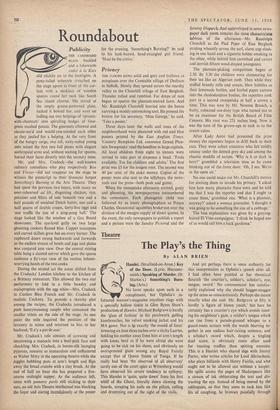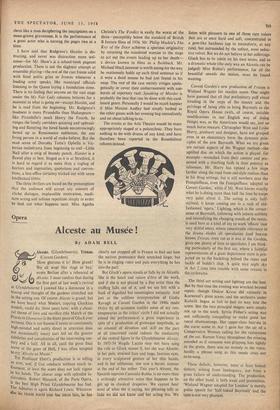Theatre
The Play's the Thing
By ALAN BRIEN
----■ .."\ of the Door. (Lyric, Hammer- smith.) Speaking of Murder. (St. Martin's.) Something's Burn- -- ing. (Arts.) No lover speaks upon oath in a compliment, but Ophelia's in- fatuated woman's-magazine royalism rings with a specially hollow tinkle in Glen Byam Shaw's production of Hamlet. Michael Redgrave is hardly the 'glass of fashion' in his patchwork golfing kneebreeches, his velvet smoking jacket and his MA gown. Nor is Ile exactly 'the mould of form' towering six foot three inches over a titchy Laertes, holding his mother away from him at arm's length with knees bent as if he were afraid she were going to be sick on his shoes, and obviously an oversprouted giant among any Royal Family except that of Queen Salote of Tonga. If he really had been 'the observed of all observers' surely one of the court spies at Wittenberg would have observed his severe tendency to epilepsy. This Hamlet is 'quite, quite down' from his first whiff of the Ghost, literally down clawing the boards, scraping his nails on the pillars, rolling and drumming out of the sight of the stalls. And yet perhaps there is some authority for this interpretation in Ophelia's speech after all. I had often been puzzled at her rhetorical flourish 'the courtier's, soldier's, scholar's, eye, tongue, sword.' No commentator has satisfac- torily explained why she should hugger-mugger up the sense so conscientiously. Perhaps she meant exactly what she said. Mr. Redgrave at fifty is hardly 'a figure of blown youth,' bUt here he certainly has a courtier's eye which avoids meet- ing his neighbour's gaze, a soldier's tongue which can rise from a parade-ground whisper to a guard-room scream with the words blurring to- gether in one endless hair-raising sentence, and a scholar's sword which, despite a tingling duel scene, is obviously more often used for toasting muffins than spitting enemies. This is a Hamlet who shared digs with Jimmy Porter, who writes articles for Lord Altrincham, who plays billiards with Henry Fairlie, and who ought not to be allowed out without a keeper. He spills across the pages of Shakespeare like a stream of ink obliterating the text and dis- tracting the eye. Instead of being moved by the soliloquies, so that they seem to rack him like fits of coughing, he browses painfully through them like a man deciphering the inscriptions on a moss-grown gravestone. It is the performance of a great actor who is turning the pages two at a time.
I have said that Redgrave's Hamlet is dis- tracting, and never was distraction more wel- come—for Mr. Shaw's is a school-book pageant .production. There is not the slightest attempt at ensemble playing—the rest of the cast freeze solid with fixed polite grins or frowns whenever a leading actor speaks, like municipal officials listening to the Queen laying a foundation stone. There is no feeling that anyone on the vast stage under the My Fair. Lady columns believes for a moment in what is going on—except Hamlet, and he is mad from the beginning. Mr. Redgrave's madness is more Pirandello than Shakespeare— like Pirandello's mock Henry the Fourth, he ranges the lonely corridors quizzing and upbraid- ing and flattering the hired hands unconvincingly tarted up as Renaissance noblemen, the one living person in a world of make-believe. But the mad scene of Dorothy Tutin's Ophelia is Vic- torian melodrama from beginning to end—Little Nell after a swig of brandy punch. Hamlet is a flawed play at best. Staged as it is at Stratford, it is hard to regard it as more than a ragbag of horrors and ingenuities, quotations and conven- tions, a box-office certainty tricked out with some intellectual titbits.
The three thrillers are based on the presumption that the audience will accept any amount of cliché dialogue, implausible motivation, medi- ocre acting and tedious repetition simply in order to .find out what happens next. Miss Agatha Christie's The Verdict is easily the worst of the three—perceptibly below the standard of British B feature films of 1936. Mr. Philip Mackie's The Key of the Door achieves a spurious originality by returning the murdered woman to the stage to act out the events leading up to her death— a device known in films as a flashback. Mr. Micheal MacLiammoir is worth seeing for the way he mutinously holds up each tired sentence as if it were a dead mouse he had just found in his soup. The rest of the cast merely cringes apolo- getically or cover their embarrassment with out- bursts of repertory rant. Speaking of Murder is probably the best that can be done with this card- board genre. Personally I would be much happier if Miss Maxine Audley had simply bashed in the other goons with her evening bag immediately and sat about talking to us.
The events at the Arts Theatre would be more appropriately staged at a polytechnic. They have nothing to do with drama of any kind,-and have therefore been reported in the Roundabout column instead. listen with pleasure to one of those rare voices that are at once hard and soft, concentrated in a gem-like hardness (up to mezzoforte, at any rate), but .surrounded by the softest, most seduc- tive velvet. But we d6 not believe in her sufferings. Gluck has to be taken on his own terms, and as a dramatic whole (the only way an Alcestis can be judged) Miss Rubio's performance, for all the beautiful sounds she makes, must be found wanting.
Covent Garden's new production of Tristan is Wieland Wagner for maiden aunts. One might have guessed that all that preliminary puff about treading in the steps of the master and the privilege of being able to bring Bayreuth to the Royal Opera House (with,. of course, suitable modifications to our English way of doing things) was, as the Americans would say, just so much horse manure. Christopher West and Leslie Hurry, producer and designer, have not grasped even in an elementary form the dynamic prin- ciples of the new Bayreuth. What we are given are certain aspects of the Wagner method—the uptilted disc on which the action is played, for example—wrenched from their context and pre- sented with a touching faith in their potency as talismans. Mr. Hurry has tiptoed a few steps farther along the road from old-style realism than in his Ring settings, but is still nowhere near the Festspielhaus, even the Festspielhaus 'adapted to Covent Garden,' while if Mr. West knows exactly what he is doing more than half the time he keeps very quiet about it. The acting is only half- stylised; it keeps coming out in a rash of old- fashioned 'opera.' Lighting, which is the corner- stone of Bayreuth, following with infinite subtlety and intensifying the changing moods of the music, is used here as a kind of toy to work 'effects' (not very skilful ones), whose conceivable relevance to the drama eludes all speculation (and heaven knows Tristan, even cut as it was at the Garden, gives one plenty of time to speculate). I am think- ing particularly of the first act, where a faithful representation of a giant department store is pro- jected on to the backdrop behind the ropes and tackle of Isolde's ship. A quite nice night sky in Act 2 runs into trouble with some creases in the cyclorama.
The third act setting and lighting are the best. But by that time the evening was wrecked beyond repair, though Otakar Kraus did valiantly in Kurwenal's great scene, and the orchestra under Kubelik began at last to feel its way into the score. But the two principal singers were simply not up to the work. Sylvia Fisher's acting was not sufficiently compelling to make good her vocal shortcomings. Her upper-class hair-do in the curse scene in Act 1 gave her the air of a Conservative Woman calling for the restoration of the cat. Ramon Vinay throughout the evening sounded as if someone was gripping him tightly in the groin; there was no melody in the voice, hardly a phrase sung as this music cries out to be sung.
These defects, however, were at least honest defects, arising from inadequacy, not from a gross failure of understanding. The production, on the other hand, is both weak and pretentious. 'Wieland Wagner adapted for London' is merely polite speech for 'half-baked Bayreuth' and the taste is not very pleasant.



































 Previous page
Previous page